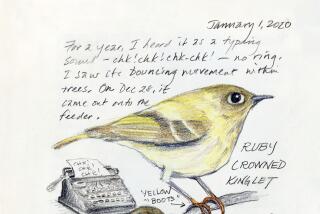Discoveries
The Chicken Chronicles
Alice Walker
(The New Press: 208 pp.,$21.95)
You pick up the book and you enter the slow, dazy world of the writer and her chickens. You put the book down to get something to eat and the spell is loosened. You think, âChickens? Am I really reading a book in which Alice Walker calls herself âMommyâ to her beloved chickens? A book in which chickens are the angels that lead Walker back into decades-old memories of her childhood that are still so dangerous that she was unable to confront them before her life with chickens?â That is when you realize how powerful Walker is, how she draws you through trauma into an Eternity, a chicken house on her peaceful bit of land in Northern California, next to her garden, where she sits on a green metal stool and watches her chickens. Itâs a book-long spell â hypnotic. (Her chickens eat organic kale and Chardonnay grapes! She writes them letters from her visit to the Dalai Lama in India, and other places. In her mind, Walker left the shack behind her motherâs garden on the farm in rural Georgia and didnât look back until the chickens made her remember the killing of chickens for food where she grew up, where the animals she loved were killed for food. She remembers how it felt when family members left without saying goodbye and she explains all this to her chickens. She wants us to understand how beautiful they are, these creatures we barely think of and all too often abuse. Itâs a high, clear place of compassion she takes us to â the chicken house, the green stool, the kale and the grapes and the corn on the cob.
You Are Free: Stories
Danzy Senna
(Riverhead Books: 240 pp., $15 paperback)
Children cry out in the night in these stories. There is a confusion of roles â dog and master, child and mother, husband and father. In most of the stories, mixed-race marriage is considered from angles that surprise and donât surprise a reader. The choices we make are revealed as empty choices, cobbled together out of need and necessity, not real freedom. The narrators are often shocking â their violence, their lust for status, their inability to empathize with others. Senna reveals things about people that we rarely see in day-to-day life. She makes it hard to judge her characters â even the young, lonely woman who confuses violence with intimacy and beats her dog. (You will be glad to leave her company, but you have a sense of where her violence comes from.) Severing readers from their entrenched moralities usually takes a lot longer (at least a novel), but Senna does it in a few carefully chosen details. The truth is seldom plain â in the title story a 33-year-old woman, Lara, receives a letter and several calls from a young woman convinced she is the daughter Lara gave up for adoption. Lara begins to wonder if the appendectomy she had when she was 13 was actually a pregnancy. Nothing is certain. Perception muddies truth. We look up relieved to live in a world of facts.
An Accidental Sportswriter: A Memoir
Robert Lipsyte
(Ecco: 256 pp., $25.99)
Robert Lipsyte was a nerd, a fat kid, a âbully magnetâ growing up in Queens, âLippo the Hippo,â and as an English major he found himself at âthe bottom of the masculinity chart.â When he applied for a summer job as a copy boy in the sports department at the New York Times, he could not have been less interested in âjock culture.â Sixty years later, after a career in print, radio, television and as a writer of young adult novels, Lipsyte looks back with great fondness at the Times (excluding former editor Howell Raines) and at the writers and athletes he admired and counted as friends: Gay Talese, Mickey Mantle, Muhammad Ali, Lance Armstrong and many others. Through his years as a sports writer his favorite stories took place on the margins of American sport: the gay athletes, the sports played in alleyways and on Indian reservations, the rare triumphs over true bullies (like the testicular cancer Lipsyte himself fought). Lipsyte comes to a better understanding of his emotionally distant father. He writes with compassion about what it means to be a family man and father, about the perils, in sport, at home and in the workplace, of an overabundance of machismo.
Salter Reynolds is a Los Angeles writer.
More to Read
Sign up for our Book Club newsletter
Get the latest news, events and more from the Los Angeles Times Book Club, and help us get L.A. reading and talking.
You may occasionally receive promotional content from the Los Angeles Times.







